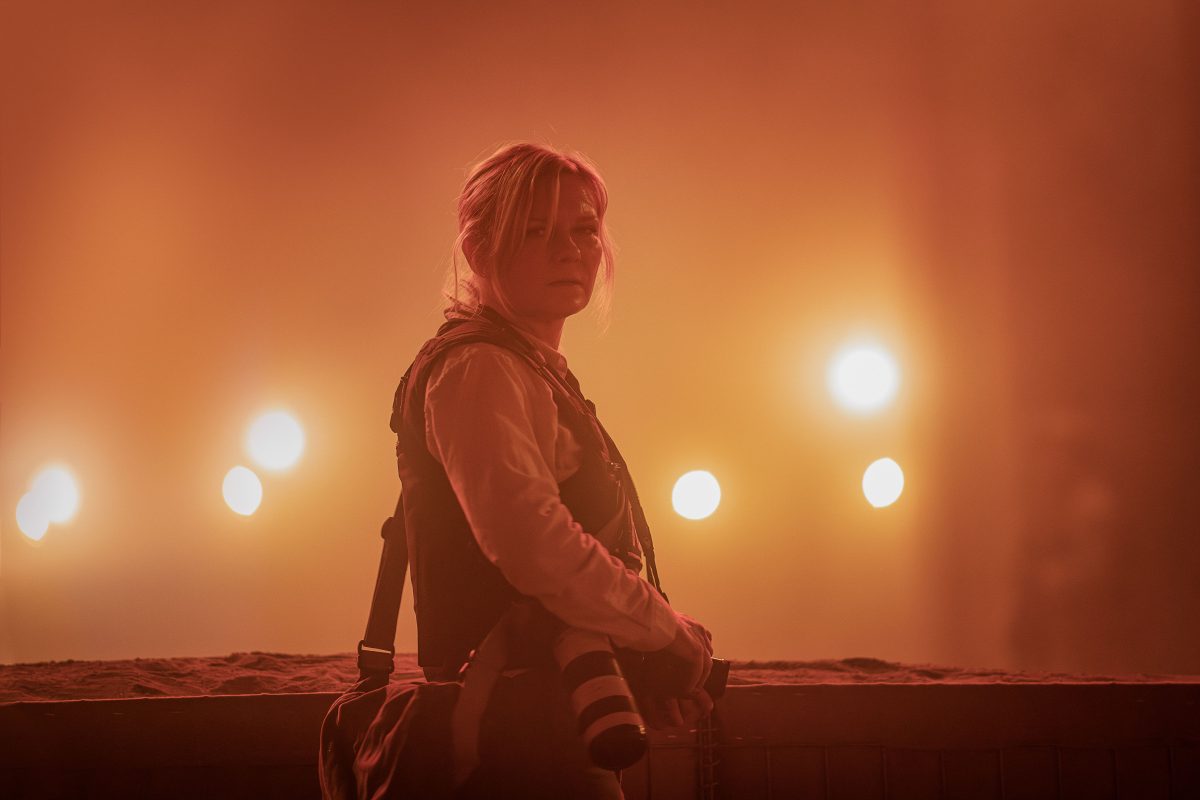
Kirsten Dunst stars in A24’s biggest film to date, Civil War. Photo: A24.
A24 has built its reputation on producing and filming stylised films on a lower budget which, for the most part, have been positively received.
A24’s independent filmography – including Moonlight, Hereditary, The Whale and Past Lives – has received critical acclaim and Oscar nominations, yet none have breached the blockbuster budget of $50 million until Civil War.
The studio’s biggest film to date puts photojournalist Lee Smith (Kirsten Dunst) in the middle of a dystopian future multiparty civil war in the United States.
With rebel factions rising across the country, Lee, her partner Joel (Wagner Moura) and aspiring journalist Jessie (Cailee Spaney) begin a road trip to Washington, DC, to interview the president, who is now in his third term and is a dictator in everything but name.
Initially, I was nervous about Civil War.
Its scale is massive, and the world is so torn that it was going to be difficult not to overwhelm its viewers. These fears were quashed pretty early on due to writer and director Alex Garland’s brilliant decision to focus on the point of view of a journalist rather than grand political figures or nameless soldiers.
This makes exposition seem natural. Journalists are tasked with asking questions, so when Lee, Joel and Jess do so, it’s not stilted or unnatural. It’s also a clever way to showcase the brutal nature of modern warfare without spending millions of dollars on creating Saving Private Ryan-level set pieces.
This is the film’s biggest strong point. The film is less a war film and more an appreciation of journalism with a warfare hook. It demonstrates the horrors that conflict journalists go through to deliver the story and the repercussions that occur not only on their mental and physical health but also on those who read/watch their works.
The story is very timely as well.
For the last six months, the conflict in Gaza has made headlines worldwide, with many viewers dismissing it as something that ‘doesn’t happen in Australia and the United States’. This film asks what would happen if it did, and should we be doing more for places where it does.
The film focuses less on the US political landscape, which I believe is both a shortcoming and a strong point. On one hand, the film isn’t the political statement that some viewers might want it to be. It isn’t glorifying Republicans or Democrats, it isn’t making fun of world leaders, it’s a story focused on the importance of truth in times of conflict.
This means the viewers aren’t segregated by political affiliation and are instead asked to look more broadly at the rest of the world’s issues. While I believe this to be a very interesting statement, those looking for an edgy statement on the United States’ current political statement will be left disappointed.
Aside from the movie’s themes and messages, everyone turns in fantastic performances. They’re all top-notch, from Kirsten Dunst as a desensitised journo to Wagner Moura as a photographer who sees the conflict as a thrill ride to Nick Offerman as the president.
A stand out for me was Jesse Plemons, who plays a devout follower of a certain warring faction. It was a relaxed yet haunting performance akin to his role as Todd in Breaking Bad.
Civil War is definitely a film with a strong political message, just not the one the title of the film may suggest. Its depiction of modern warfare has stuck with me since walking out of the theatre and has left me asking questions about conflicts continuing around the world.
Its brilliant direction, use of characters and storytelling have this sitting in my top three movies of the year so far.
Civil War is currently showing in cinemas across the country.












